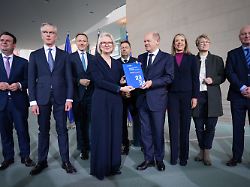Difficult recovery from recession
“Economic wise” only see mini-growth in 2024
November 8, 2023, 3:02 p.m
Listen to article
This audio version was artificially generated. More info | Send feedback
The growth prospects are poor: the Federal Government’s Advisory Council presents its economic forecast, and it doesn’t give much hope. After a minus of 0.4 percent this year, the “economists” only expect an increase of 0.7 percent next year.
According to important advisors to the federal government, the German economy is not really getting going this year or next. The reasons for this are, on the one hand, the consequences of the energy price crisis, a decline in domestic demand and geopolitical sources of conflict, explained the “Economists”. The Council of Experts is even more concerned about structural problems such as a lack of workers and a lack of modernization in companies. Experts warned that they could slow down the economy for decades.
For this year they expect economic output to shrink by 0.4 percent. This means that the “economists” are significantly more pessimistic than they were in the spring. In March they predicted that Germany would narrowly avoid a recession.
In the meantime, however, the prospects have worsened again. Both the federal government and the leading economic research institutes recently lowered their forecasts, some significantly. They also expect a decline of 0.4 to 0.6 percent. Germany is emerging from the crisis more slowly than expected, said Economics Minister Robert Habeck. But he sees a bottom being reached.
According to the consensus of the federal government and the institutes, the economy should grow again by at least 1.3 percent in 2024. The Council of Experts was not quite as optimistic here: it only forecast an increase of 0.7 percent for 2024. Private consumer spending is recovering and the average inflation rate will fall to 2.6 percent. However, the global economy – especially in China – is recovering only slowly. The export-oriented German economy is feeling this particularly strongly.
Population and industry are aging
“Germany has recorded the lowest growth of all economies in the euro area since the beginning of the corona pandemic,” explained the five “economists”. An even deeper slump was prevented by “the extensive economic policy measures to convert the energy supply and to cushion the economic effects of the energy crisis”. Companies and households have also shown themselves to be very adaptable.
The experts explained that the reason for the particularly poor development in Germany compared to international standards is, on the one hand, the high share of energy-intensive industries in German gross value added. In addition, the medium and long-term projection of Germany’s production potential “points to clear obstacles to growth in the coming decades, regardless of the current economic weakness.”
However, if the federal government and companies do not act now, Germany will face completely different problems in the coming decades, economists warned. Namely an aging not only of the population, but also of the industry, because too little is being modernized. Against this background, the experts recommend more incentives for employment, a reform of immigration policy, more investments and openness to new technology such as artificial intelligence.
In order to relieve the burden on the statutory pension insurance, economists are suggesting a higher retirement age – but without naming a number. In general, from their point of view, entry into retirement should be linked to increasing life expectancy. The Council of Experts for the Assessment of Overall Economic Development advises politicians, but acts independently of them. The five women and men on the committee – all professors – are colloquially referred to as “economics”.
